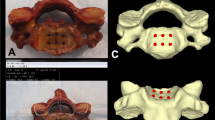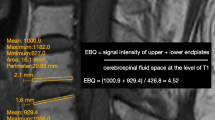Abstract
Cervical interbody device subsidence can result in screw breakage, plate dislodgement, and/or kyphosis. Preoperative bone density measurement may be helpful in predicting the complications associated with anterior cervical surgery. This is especially important when a motion preserving device is implanted given the detrimental effect of subsidence on the postoperative segmental motion following disc replacement. To evaluate the structural properties of the cervical endplate and examine the correlation with CT measured trabecular bone density. Eight fresh human cadaver cervical spines (C2–T1) were CT scanned and the average trabecular bone densities of the vertebral bodies (C3–C7) were measured. Each endplate surface was biomechanically tested for regional yield load and stiffness using an indentation test method. Overall average density of the cervical vertebral body trabecular bone was 270 ± 74 mg/cm3. There was no significant difference between levels. The yield load and stiffness from the indentation test of the endplate averaged 139 ± 99 N and 156 ± 52 N/mm across all cervical levels, endplate surfaces, and regional locations. The posterior aspect of the endplate had significantly higher yield load and stiffness in comparison to the anterior aspect and the lateral aspect had significantly higher yield load in comparison to the midline aspect. There was a significant correlation between the average yield load and stiffness of the cervical endplate and the trabecular bone density on regression analysis. Although there are significant regional variations in the endplate structural properties, the average of the endplate yield loads and stiffnesses correlated with the trabecular bone density. Given the morbidity associated with subsidence of interbody devices, a reliable and predictive method of measuring endplate strength in the cervical spine is required. Bone density measures may be used preoperatively to assist in the prediction of the strength of the vertebral endplate. A threshold density measure has yet to be established where the probability of endplate fracture outweighs the benefit of anterior cervical procedure.





Similar content being viewed by others
References
Amstutz HC, Sissons HA (1969) The structure of the vertebral spongiosa. J Bone Joint Surg Br 51:540–550
Bergot C, Laval-Jeantet AM, Hutchinson K, Dautraix I, Caulin F, Genant HK (2001) A comparison of spinal quantitative computed tomography with dual energy X-ray absorptiometry in European women with vertebral and nonvertebral fractures. Calcif Tissue Int 68:74–82
Biggemann M, Hilweg D, Brinckmann P (1988) Prediction of the compressive strength of vertebral bodies of the lumbar spine by quantitative computed tomography. Skeletal Radiol 17:264–269
Biggemann M, Hilweg D, Seidel S, Horst M, Brinckmann P (1991) Risk of vertebral insufficiency fractures in relation to compressive strength predicted by quantitative computed tomography. Eur J Radiol 13:6–10
Bohlman HH, Emery SE, Goodfellow DB, Jones PK (1993) Robinson anterior cervical discectomy and arthrodesis for cervical radiculopathy. Long-term follow-up of one hundred and twenty-two patients. J Bone Joint Surg Am 75:1298–1307
Brinckmann P, Biggemann M, Hilweg D (1989) Prediction of the compressive strength of human lumbar vertebrae. Spine 14:606–610
Brodke DS, Zdeblick TA (1992) Modified Smith–Robinson procedure for anterior cervical discectomy and fusion. Spine 17:S427–S430
Closkey RF, Parsons JR, Lee CK, Blacksin MF, Zimmerman MC (1993) Mechanics of interbody spinal fusion. Analysis of critical bone graft area. Spine 18:1011–1015
Ebbesen EN, Thomsen JS, Beck-Nielsen H, Nepper-Rasmussen HJ, Mosekilde L (1999) Lumbar vertebral body compressive strength evaluated by dual-energy X-ray absorptiometry, quantitative computed tomography, and ashing. Bone 25:713–724
Emery SE, Bolesta MJ, Banks MA, Jones PK (1994) Robinson anterior cervical fusion comparison of the standard and modified techniques. Spine 19:660–663
Formica CA, Nieves JW, Cosman F, Garrett P, Lindsay R (1998) Comparative assessment of bone mineral measurements using dual X-ray absorptiometry and peripheral quantitative computed tomography. Osteoporos Int 8:460–467
Grampp S, Jergas M, Lang P, Steiner E, Fuerst T, Gluer CC, Mathur A, Genant HK (1996) Quantitative CT assessment of the lumbar spine and radius in patients with osteoporosis. Am J Roentgenol 167:133–140
Grant JP, Oxland TR, Dvorak MF (2001) Mapping the structural properties of the lumbosacral vertebral endplates. Spine 26:889–896
Grant JP, Oxland TR, Dvorak MF, Fisher CG (2002) The effects of bone density and disc degeneration on the structural property distributions in the lower lumbar vertebral endplates. J Orthop Res 20:1115–1120
Grubb MR, Currier BL, Shih JS, Bonin V, Grabowski JJ, Chao EY (1998) Biomechanical evaluation of anterior cervical spine stabilization. Spine 23:886–892
Hasegawa K, Abe M, Washio T, Hara T (2001) An experimental study on the interface strength between titanium mesh cage and vertebra in reference to vertebral bone mineral density. Spine 26:957–963
Hollowell JP, Vollmer DG, Wilson CR, Pintar FA, Yoganandan N (1996) Biomechanical analysis of thoracolumbar interbody constructs. How important is the endplate? Spine 21:1032–1036
Keller TS, Hansson TH, Abram AC, Spengler DM, Panjabi MM (1989) Regional variations in the compressive properties of lumbar vertebral trabeculae. Effects of disc degeneration. Spine 14:1012–1019
Li JY, Zhu QA, Yuan L, Zhao WD, Lin LJ, Zhang MC, Huang WH (2003) Role of the biomechanical property of the endplate in anterior cervical fusion. Di Yi Jun Yi Da Xue Xue Bao 23:402–408
Li JY, Zhao WD, Zhu QA, Yuan L, Li M, Lin LJ, Zhang MC (2004) [The effect of disc degeneration on the structural property distributions in the cervical vertebral endplates.]. Zhonghua Wai Ke Za Zhi 42:1330–1332
Lim TH, Kwon H, Jeon CH, Kim JG, Sokolowski M, Natarajan R, An HS, Andersson GB (2001) Effect of endplate conditions and bone mineral density on the compressive strength of the graft-endplate interface in anterior cervical spine fusion. Spine 26:951–956
Lowe TG, Hashim S, Wilson LA, O’Brien MF, Smith DA, Diekmann MJ, Trommeter J (2004) A biomechanical study of regional endplate strength and cage morphology as it relates to structural interbody support. Spine 29:2389–2394
Macdonald RL, Fehlings MG, Tator CH, Lozano A, Fleming JR, Gentili F, Bernstein M, Wallace MC, Tasker RR (1997) Multilevel anterior cervical corpectomy and fibular allograft fusion for cervical myelopathy. J Neurosurg 86:990–997
Ochia RS, Tencer AF, Ching RP (2003) Effect of loading rate on endplate and vertebral body strength in human lumbar vertebrae. J Biomech 36:1875–1881
Oxland TR, Grant JP, Dvorak MF, Fisher CG (2003) Effects of endplate removal on the structural properties of the lower lumbar vertebral bodies. Spine 28:771–777
Pacifici R, Susman N, Carr PL, Birge SJ, Avioli LV (1987) Single and dual energy tomographic analysis of spinal trabecular bone: a comparative study in normal and osteoporotic women. J Clin Endocrinol Metab 64:209–214
Parkinson RJ, Durkin JL, Callaghan JP (2005) Estimating the compressive strength of the porcine cervical spine: an examination of the utility of DXA. Spine 30:E492–E498
Rapoff AJ, Conrad BP, Johnson WM, Cordista A, Rechtine GR (2003) Load sharing in Premier and Zephir anterior cervical plates. Spine 28:2648–2650; discussion 2651
Roberts S, McCall IW, Menage J, Haddaway MJ, Eisenstein SM (1997) Does the thickness of the vertebral subchondral bone reflect the composition of the intervertebral disc? Eur Spine J 6:385–389
Sasso RC, Ruggiero RA Jr, Reilly TM, Hall PV (2003) Early reconstruction failures after multilevel cervical corpectomy. Spine 28:140–142
Spivak JM, Chen D, Kummer FJ (1999) The effect of locking fixation screws on the stability of anterior cervical plating. Spine 24:334–338
Steffen T, Tsantrizos A, Aebi M (2000) Effect of implant design and endplate preparation on the compressive strength of interbody fusion constructs. Spine 25:1077–1084
Thickman D, Nodine C, Iddenden D (1990) Quantitative CT of the spine. Significance of intervertebral body variability. Invest Radiol 25:19–23
Truumees E, Demetropoulos CK, Yang KH, Herkowitz HN (2003) Failure of human cervical endplates: a cadaveric experimental model. Spine 28:2204–2208
Vaccaro AR, Falatyn SP, Scuderi GJ, Eismont FJ, McGuire RA, Singh K, Garfin SR (1998) Early failure of long segment anterior cervical plate fixation. J Spinal Disord 11:410–415
Acknowledgment
Partial research funding for this study was provided by Synthes Spine.
Author information
Authors and Affiliations
Corresponding author
Additional information
An erratum to this article is available at http://dx.doi.org/10.1007/s00586-007-0505-9.
Rights and permissions
About this article
Cite this article
Ordway, N.R., Lu, YM., Zhang, X. et al. Correlation of cervical endplate strength with CT measured subchondral bone density. Eur Spine J 16, 2104–2109 (2007). https://doi.org/10.1007/s00586-007-0482-z
Received:
Revised:
Accepted:
Published:
Issue Date:
DOI: https://doi.org/10.1007/s00586-007-0482-z




